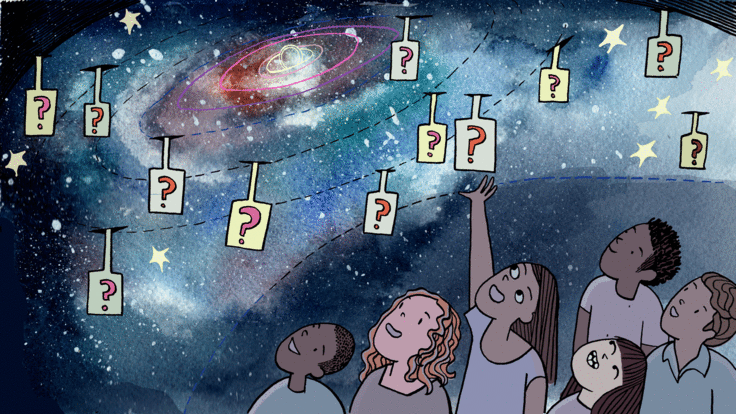
Physicist Dan Hooper, left, is a founding member of soul band The Congregation. Photo courtesy of Dan Hooper.
This Sunday, guitarist Charlie Wayne played for a crowd of about 10,000 with his up-and-coming Chicago soul band. They opened for alt-rockers Wilco at a ballpark outside the city.
The next morning, he went back to his day job at Fermi National Accelerator Laboratory, where he investigates the cosmos – and answers to his given name, Dan Hooper.
For the past seven years, Hooper has been part of the laboratory’s theoretical astrophysics group. He has written two books about dark matter, but he typically juggles projects on several subjects at a time. His most recent physics paper dealt with LHC scientists' discovery of a possible Higgs boson.
Hooper found his fascination with physics in college, but he’s been playing guitar since he was 15.
“It started as a furious act of rebellion,” Hooper said. “I can’t think of a better reason to start playing guitar.”
Hooper formed a metal band in Cold Spring, Minnesota. At 16, he was playing a regular circuit in bars around the state. Over the past couple of decades, Hooper has played in blues bands, punk bands, an alt-country band and – as a postdoc at the University of Oxford – in a band composed of several astrophysicists and banjo-player Jem Finer of Irish punk band the Pogues.
“By leaps and bounds,” none of those groups saw as much success as his current band, The Congregation, he said.
The Congregation usually plays at small- to mid-size venues and outdoor festivals in the Chicago area. But at the sold-out Wilco show, the band had a stadium-size audience clapping and doing call-and-response. In August Hooper and his fellow musicians will open for Garbage and The Flaming Lips in Madison.
The Congregation was born about two and a half years ago at a red-walled Chicago bar called “darkroom,” when Hooper’s alt-country group shared the stage with a classic rock cover band. At the sound check, the cover band’s singer/drummer, Gina Bloom, performed the Motown hit “I Heard It Through the Grapevine” with a big voice Hooper and his band-mates could not ignore.
“It’s undeniably an incredible voice, as anyone who’s ever heard it will agree,” Hooper said. “We were so impressed, we decided we were going to steal her and start a soul band.”
Hooper approached Bloom at the end of the show and asked if she’d be interested in forming a “Stax-era” type of group. Stax Records, founded in 1957, produced Southern soul artists like Otis Redding and Booker T. & the M.G.s.
“I didn’t know what Stax was, per se, but I heard ‘soul,’” Bloom said. “I said, ‘Sure.’”

On Sunday, The Congregation played for a crowd of thousands at a ballpark outside of Chicago. Photo by CB Lindsey.
Over the next six months, Hooper, Bloom and part of the former alt-country band built The Congregation out of, among other characters, a physicist, a teacher for Chicago public schools, a senior benefits analyst at Mesirow Financial and an IT specialist at Chicago’s Navy Pier. They spent the past year recording their debut album, which they will release in late September.
Hooper wrote many of the songs, but his lyrics steer clear of astrophysics metaphors; the only dark matter he addresses is heartbreak.
Instead, his passion for science shows through his personality and the detailed way he tackles arranging and recording a song, Bloom said. “He takes the work he does for physics very seriously, and he takes the work he does for our band very seriously. He puts the same kind of dedication into his craft and songwriting.”
Once, back in his guitar-smashing days up north, Hooper considered becoming a professional musician. However, if The Congregation takes off today, he’s not interested in leaving Fermilab to go on tour.
“My musician friends don’t understand how I can say this, but I like doing physics more than I like doing music,” he said. “I have the best job in the world.”












